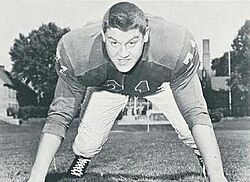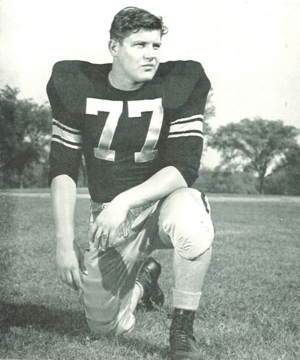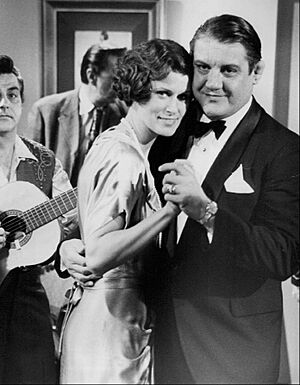Alex Karras facts for kids

Karras in 1961
|
|||||
| No. 71 | |||||
|---|---|---|---|---|---|
| Position: | Defensive tackle | ||||
| Personal information | |||||
| Born: | July 15, 1935 Gary, Indiana, U.S. |
||||
| Died: | October 10, 2012 (aged 77) Los Angeles, California, U.S. |
||||
| Height: | 6 ft 2 in (1.88 m) | ||||
| Weight: | 248 lb (112 kg) | ||||
| Career information | |||||
| High school: | Emerson (Gary) | ||||
| College: | Iowa (1955–1957) | ||||
| NFL Draft: | 1958 / Round: 1 / Pick: 10 | ||||
| Career history | |||||
|
|||||
| Career highlights and awards | |||||
|
|||||
| Career NFL statistics | |||||
|
|||||
| Player stats at PFR | |||||
|
Pro Football Hall of Fame
|
|||||
|
College Football Hall of Fame
|
|||||
Alexander George Karras (July 15, 1935 – October 10, 2012) was an American football player, sportscaster, and actor. He was a four-time Pro Bowl player. He played defensive tackle for the Detroit Lions in the National Football League (NFL). He played for the Lions from 1958 to 1970. Alex Karras is a member of the College Football Hall of Fame. He was also chosen for the Pro Football Hall of Fame in 2020.
As an actor, Karras was famous for playing Mongo in the 1974 comedy movie Blazing Saddles. He also starred as George Papadopolis in the TV show Webster (1983–1989). In this show, he played the adoptive father of Webster Long (Emmanuel Lewis). His real-life wife, Susan Clark, played his TV wife. Karras also had a big role in the movie Victor/Victoria, which starred Julie Andrews and James Garner.
Contents
Early Life & High School
Alex Karras was born and grew up in Gary, Indiana. His father, Dr. George Karras, was a doctor from Greece. His mother, Emmeline, was a nurse from Canada. Alex's father passed away when Alex was thirteen.
Alex learned to play football in a parking lot near his home. He played with his athletic brothers. He became a great player at Gary's Emerson High School. He was chosen for the Indiana all-state team four times. Karras was also good at other sports, like baseball, track, wrestling, and basketball. He finished high school in 1954.
College Football Career
Alex's older brothers, Lou and Ted, played college football. Ted later played for the Bears and Lions. Alex decided to play for the Iowa Hawkeyes. He joined the team after high school.
Karras had some challenges when he first started at Iowa. He found his classes tough and missed home. He also had a difficult relationship with his coach, Forest Evashevski. In his second year, 1955, Karras started the season weighing too much. He had been told he needed to gain weight for pro football. This made him much heavier than his coaches wanted.
Karras also had a cracked anklebone that season. After not playing in the last game, he left the team. He did not earn a football letter for 1955.
Karras went to summer classes and lost the extra weight. He rejoined the football team. However, his relationship with the coach remained strained. Karras agreed to return only if the coach would only talk to him about football.
In 1956, Iowa won the Big Ten title. They also earned their first trip to the Rose Bowl. Karras helped seal the win against Ohio State with a sack on the final play. Iowa then beat Notre Dame 48–8. Karras said this was his biggest college win. He helped the Hawkeyes win the Rose Bowl against Oregon State 35–19. He was chosen as a first-team All-American in 1956.
In his senior year in 1957, Karras was the best lineman in college football. He won the Outland Trophy. He also finished second in the voting for the Heisman Trophy. This is very rare for a lineman. Karras was a consensus first-team All-American in 1957.
Professional Football Career
Alex Karras was the tenth player chosen in the 1958 NFL draft. He was picked by the Detroit Lions. He quickly became one of the best defensive tackles in the NFL. He played for 12 seasons (1958–1962, 1964–1970), all with the Lions.
In 1963, Karras was suspended by the league for breaking rules about betting on NFL games. He returned to playing in 1964. When an official asked him to call the coin toss before a game, Karras famously replied, "I'm sorry, sir, I'm not permitted to gamble."
From 1960 to 1966, Karras played alongside Roger Brown. They formed a very strong pair of defensive tackles. Karras was an All-Pro player from 1967 to 1969. His last game was in the 1970 NFL playoffs. The Lions lost to the Dallas Cowboys 5–0.
After the 1971 preseason, Karras was released by the Lions. He was 36 years old. He had played 161 games for the Lions, which is one of the most in team history. He was called an "iron man" because he missed only one game due to injury. He made the Pro Bowl four times. The Hall of Fame named him a member of the 1960s All-Decade team.
On January 15, 2020, Alex Karras was chosen for the Pro Football Hall of Fame.
Film and Television Career
Alex Karras was known for his sense of humor. Writer George Plimpton heard many stories about Karras. When the movie Paper Lion was made in 1968, Karras played himself. This was his first movie role.
After leaving the Lions in 1971, Karras started acting full-time. He appeared on The Tonight Show Starring Johnny Carson and The Mary Tyler Moore Show. In 1974, he had a memorable role as Mongo in the western comedy Blazing Saddles. Mongo was a very strong and slow-witted character. He famously knocked out a horse with one punch. Mongo also said, "I'm only pawn in game of life," a line often quoted after Karras passed away.
In 1974, Karras also became a commentator for Monday Night Football. He worked in this role for three years. One famous comment he made was about Oakland Raiders lineman Otis Sistrunk. Karras joked that Sistrunk, who didn't go to college, was from "the University of Mars."
Karras continued acting in movies like Porky's, where he played Sheriff Wallace. His wife, Susan Clark, also starred in Porky's. He played Hans Brumbaugh in the TV miniseries Centennial. In 1982, he played James Garner's bodyguard in the movie Victor/Victoria.
In the 1980s, Karras had great success in the TV show Webster. He played George Papadapolis, the adoptive father of the main character, Webster. This role showed his softer side. His real-life wife, Susan Clark, played his wife in the show. Karras and Clark also produced the series. They met in 1975 while filming the TV movie Babe.
Writing
Alex Karras was one of the main people written about in George Plimpton's book Paper Lion (1966). He was also a subject in Plimpton's book Mad Ducks and Bears (1973). During his last years with the Detroit Lions, Karras wrote a journal about his experiences. This was published in the Detroit Free Press. He later wrote a book about his life called Even Big Guys Cry (1978). He also wrote a novel, Tuesday Night Football (1991).
Honors and Awards
In 1989, Iowa Hawkeye fans chose an all-time team. Alex Karras was voted onto this team as a defensive lineman. He was inducted into the Iowa Sports Hall of Fame in 1977. He also joined the College Football Hall of Fame in 1991.
In 2014, the Big Ten Network named Karras as one of the top four players in Iowa Football history. This was based on online fan voting.
On October 28, 2018, the Detroit Lions honored Karras by adding him to their team's ring of honor. He was honored alongside former Lions Herman Moore and Roger Brown.
On January 15, 2020, the NFL announced that Karras would be inducted into the Pro Football Hall of Fame.
Later Activities
Karras also worked briefly as a football coach in 2007 and 2008. He was an assistant coach for Bob Lombardi in the SIL. He owned an ice cream shop in Surfside Beach, South Carolina, called The Cow.
Personal Life
Alex Karras was married two times. In 1958, he married Joan Jurgensen. They had five children together. They divorced in 1975. He married actress Susan Clark on March 21, 1980. They had one daughter together.
Illness and Passing
In his later years, Alex Karras had serious health problems. These included dementia, heart disease, and cancer.
Karras was one of many former NFL players who filed lawsuits against the NFL in 2012. These lawsuits were about the long-term health problems caused by concussions and repeated hits to the head during their playing careers.
On October 8, 2012, it was shared that Karras had been diagnosed with kidney failure. He was cared for at the Saint John's Health Center in Santa Monica, California. He then went home to be with his family. Alex Karras passed away on the morning of October 10, 2012.
Filmography
| Year | Title | Role | Notes |
|---|---|---|---|
| 1968 | Paper Lion | Himself | |
| 1972 | Hardcase | Booker Llewellyn | |
| 1973 | The 500 Pound Jerk | Hughie Rae Feather | |
| 1973 | The Odd Couple | Jake Metcalf | |
| 1974 | Blazing Saddles | Mongo | |
| 1974 | The Great Lester Boggs | Sheriff Billy Bob | |
| 1974 | M*A*S*H | Lance Corporal Lyle Wesson | |
| 1974 | Win, Place or Steal | Frank | |
| 1975 | Babe | George Zaharias | |
| 1977 | Mad Bull | Iago "Mad Bull" Karkus | TV movie |
| 1978 | FM | Doc Holliday | |
| 1978 | Jacob Two-Two Meets the Hooded Fang | The Hooded Fang | |
| 1978 | Centennial | Hans Brumbaugh | TV Mini-Series, 12 episodes |
| 1980 | When Time Ran Out | "Tiny" Baker | |
| 1980 | Alcatraz: The Whole Shocking Story | E.J. "Jughead" Miller | |
| 1981 | Nobody's Perfekt | Swaboda | |
| 1981 | Porky's | Sheriff Wallace | |
| 1982 | Victor/Victoria | "Squash" Bernstein | |
| 1983–1987 | Webster | George Papadopolis | |
| 1984 | Against All Odds | Hank Sully | |
| 1994 | Street Corner Kids | Floyd Powell | |
| 1995 | Fudge-a-Mania | Big A | TV movie; considered the pilot for the TV series Fudge |
| 1998 | Buffalo '66 | TV Sportscaster |
See also
 In Spanish: Alex Karras para niños
In Spanish: Alex Karras para niños
- List of gridiron football players who became professional wrestlers
 | Ernest Everett Just |
 | Mary Jackson |
 | Emmett Chappelle |
 | Marie Maynard Daly |



